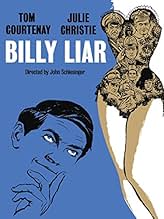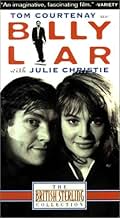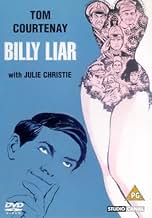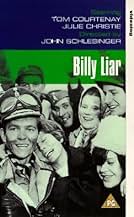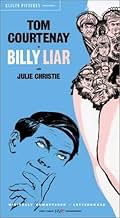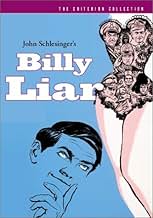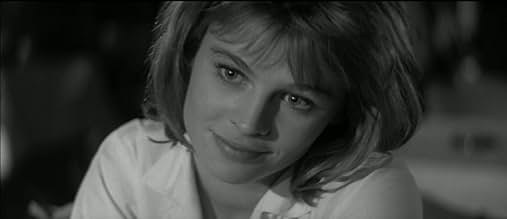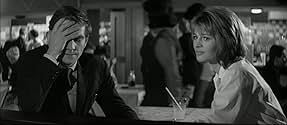Füge eine Handlung in deiner Sprache hinzuA lazy, irresponsible young clerk (Sir Tom Courtenay) in provincial Northern England lives in his own fantasy world and makes emotionally immature decisions as he alienates friends and famil... Alles lesenA lazy, irresponsible young clerk (Sir Tom Courtenay) in provincial Northern England lives in his own fantasy world and makes emotionally immature decisions as he alienates friends and family.A lazy, irresponsible young clerk (Sir Tom Courtenay) in provincial Northern England lives in his own fantasy world and makes emotionally immature decisions as he alienates friends and family.
- Nominiert für 6 BAFTA Awards
- 1 Gewinn & 7 Nominierungen insgesamt
- Prisoner Escort
- (Nicht genannt)
- Bit Part
- (Nicht genannt)
- Serviceman
- (Nicht genannt)
Empfohlene Bewertungen
Billed as a "gay" movie by TCM when they played this in 2017, and the basis for that is fair enough—director John Schlesinger was openly gay, and the feeling of this film is very much about being an outsider to a larger culture. Which in the early 1960s is what most gay men (and women) experienced.
Heads up—this is a very British film, and it's on the cusp of a new Britain, getting out from World War II burdens and about to see the Beatles take over the world. In short, Mod England is in full swing, and the surprising new actress Julie Christie is key here. Maybe I'm just a guy, but I think the charm and honest presence of Christie from the first glimpse in a lorry (truck for you Americans) is a spark of life that tips the movie over. Great stuff.
The star however is the title character, played by Tom Courtenay, whose real character name is Billy Fisher. He's terrific, playing a cad of sorts, someone who lives by effect, a former soldier (in his head) who has settled uncomfortably into his beloved England.
The pace is crisp and the fast cuts are unusual for the time. There are oddities—early on he plays blackface in one scene (in his imagination), a woman in another (also daydreaming). It's farce top to bottom, and raw comedy. I think the British laughed harder by far than us poor Americans, but it's a lark and a fancy through and through. The flavor of it reminds me of "A Hard Days Night" and in fact they both come out of the so called British New Cinema.
The film is imaginative in its structure, depending on the wandering thoughts of Billy to change the scene at will. It's cheeky but clever, and keeps you looking. And chuckling. As a comedy it might not be uproarious, but it never lets up its absurdity. It's called Billy Liar because Billy succeeds with his co-workers and family by making things up. Endlessly.
Eventually you have to ask if the film can be read as an insight into being a gay man in these times. Certainly it can. It cheerfully points out how painful it is to be misunderstood and maligned for no good reason. It was easy to understand Billy as a a would-be success pushed down by his willing non-conformity. But it is also troubling to admit that this is something that is insinuated by TCM at the start—if you see the movie as a straight movie about an eccentric (not gay in particular) it has a different and less serious feel.
Maybe it's fair to let it be both, or let it float depending on the viewer. Because it remains fast, inventive, and funny throughout. Even the camera-work is fun, with lots of wide angle and with moving pans across landscapes that distort the world. Appropriately.
The final verdict: this is a film about the new England, the land of youth poking fun at the serious old school England of lore (and of WWII). It attacks this with necessary humor (not to offend absolutely everyone) and with visual pizazz. It wears slightly thin at times, and you do wonder what really matters about this aimless chap, but in all it's refreshing and revealing of the era.
And it has Julie Christie in her first film. As she says with revealing authority, "I don't want to get engaged, I want to get married." Yeah.
Tom Courtenay and Julie Christie (Liz) leapfrogged to stardom with their performances but every actor is beautifully cast: Mona Washbourne, Wilfred Pickles, and Ethel Griffies are the character types who give Billy's family heartbreaking nuances while Helen Fraser and Gwendolyn Watts bring a refreshingly sympathetic humanity to his polar opposite fiancees.
Liz's entrance, Billy's fantasies, a dance hall sequence, a quiet hospital exchange between Billy and his mother, and the final choice are classic scenes that have been constructed with genius by John Schlesinger (Darling, Midnight Cowboy, Sunday Bloody Sunday). The Criterion Collection's DVD treatment of Billy Liar is a standout and shouldn't be missed. It's a great film.
Billy Liar was always a terrific film, but like so many of its kitchen-sink contemporaries (Saturday Night and Sunday Morning, A Kind of Loving) it has actually grown in substance and depth since its release. Part of the reason is the extensive use of on-location filming all these movies utilised: a post-war industrial landscape long since lost and therefore all the more vivid in its posterity. But where Billy Liar gets a bigger march on its predecessors - whether by intent or accident - is that it captures this landscape on the cusp of the swinging sixties, when architecture, culture, leisure and morality were all rapidly changing. In doing so it heralds many of the themes and issues that were to dominate western culture for the remainder of the 20th Century: pop culture, advertising, media obsession, celebrity, race relations and fantasy lifestyles.
Billy seemed an endearing but essentially lost soul in his day; an immature weakling unable to face up to the realities and responsibilities of adulthood. But looked at from the hindsight of 40 years he now seems symptomatic of what is today regarded as normal, almost aspirational, behaviour: self-absorption; avoidance of responsibility; glorification of celebrity; escape culture.
Whether director John Schelsinger and writers Keith Waterhouse and Willis Hall foresaw all the cultural and sociological changes they captured is something only they would know (they surely couldn't have seen the significance of casting Julie Christie - one of the ultimate swinging sixties icons). Whatever the case, what makes Billy Liar such a fascinating film is the casual, uncritical and unselfconscious way its many themes are observed. Its lack of preachiness or self-righteousness help keep it a fresh and funny entertainment that can be enjoyed at that level. Its historical importance as a perfect snapshot of a country at a time of rapid and fundamental change is nothing less than priceless.
Wusstest du schon
- WissenswertesThis movie made a star of Julie Christie, even though she's only in it for a total of twelve minutes.
- PatzerIn the opening title sequence, where a woman places a blanket over a balcony and runs off, an arm can be seen popping up from behind the wall and throwing the blanket off the balcony.
- Zitate
Alice Fisher: If you're in any more trouble, Billy, it's not something you can leave behind you, you know. You put it in your suitcase, and you take it with you.
- VerbindungenFeatured in Film Review: Julie Christie & John Schlesinger (1967)
- SoundtracksTwisterella
Performed by Muriel Day (dubbed by unknown vocalist)
Top-Auswahl
- How long is Billy Liar?Powered by Alexa
Details
- Erscheinungsdatum
- Herkunftsland
- Sprache
- Auch bekannt als
- Billy Liar
- Drehorte
- 37 Midland Road, Baildon, Shipley, Bradford, West Yorkshire, England, Vereinigtes Königreich(Billy's house, Stradhoughton)
- Produktionsfirmen
- Weitere beteiligte Unternehmen bei IMDbPro anzeigen
Box Office
- Budget
- 236.809 £ (geschätzt)
- Weltweiter Bruttoertrag
- 29.153 $
- Laufzeit1 Stunde 38 Minuten
- Farbe
- Seitenverhältnis
- 2.35 : 1


